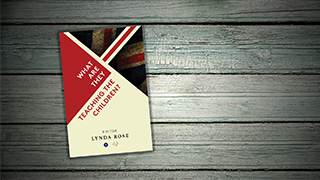Book Review: 'What Are They Teaching The Children?'

"The education of the next generation is a key battleground for the soul of our society." So says Christian Concern's Tim Dieppe in his review of a new book launched by Wilberforce Publications, 'What are they teaching the children?'
Tim summarises the book, which explains some of the challenges our children are facing. "This book is a useful and welcome resource for those interested in upholding Christian values in our education system," he concludes.
This book is a collection of in-depth essays by leading experts on various aspects of education in British schools today. The idea of the book was conceived by June Cash, a founder member of Voice for Justice, who sadly died last year. She wrote the first essay on 'The Christian Origins of the UK's Modern Educational System' which is insightful and fascinating, though unfortunately unfinished, cut short by her death. She traces the history of education in Britain back to Alfred the Great, whose statue inscription says that he "found learning dead and he restored it; education neglected, and he revived it." It was later local churches that led the way in establishing schools for working class children. The first education Bill required these church schools to be open to people of all denominations. Cash quotes the Earl of Shaftesbury who said in the House of Lords:
"I can have no confidence in any system of education which is not based on the great doctrines of religion and which does not impart to the mind of a child a deep sense that it is an immortal and responsible being … and that there will come a day when it must tender an account not only of its actions but also of its thoughts."
It is this kind of sentiment that continues to shape education in Britain to this day, with the 1996 Education Act requiring a broadly Christian act of collective worship to be held in schools. C.S. Lewis is quoted saying: "Education without values, as useful as it is, seems rather to make man a more clever devil." The question is what values our children our being taught?
A range of chapters follow, on the 'Battle for the Soul of our Nation', education in different worldviews, parental responsibility for education, and secularism in education. There is a chapter demonstrating how CHIPS (Challenging Homophobia in Primary Schools) is a system of indoctrination. Another on the indoctrination of scientism in our schools through the silencing of debate about intelligent design. A further chapter on whether Christian assemblies are still relevant, and another on how human rights have been taken further than anticipated and are now used to silence certain moral views.
Dr Christopher Shell contributes two chapters on 'British values' which comprise a devastating critique of the concept. He writes that there is an elephant in the room:
"The values our older citizens grew up with (pre-c.1962) are often opposed to today's values. 'British values' has no clear meaning unless the slate of pre-1963 memory be wiped clean Soviet-style."
What matters, as Shell points out, is not how 'British' any values are, but whether they are good or beneficial. He proceeds to show that on multiple measures, society is worse today than in the 1950s and therefore our newly imposed secular values have objectively been bad for society. He moves on to criticise some of the much-heralded values, for example 'tolerance' as an ultimate value undermines tolerance, because people are forced to tolerate others' behaviour.
The book closes with a chapter by Baroness Cox reflecting on her own experiences of resisting the secularisation of education. She quotes T.S. Elliot as saying "A society has not ceased to be a Christian society until it has become positively something else," and argues that we are therefore still a Christian country. She recounts her experience of fighting the battle to reinstate religious education in schools in 1988, and to ensure that it is primarily Christian. She quotes extensively from the parliamentary debates at the time. She concludes by quoting Archbishop Ben Kwashi in Nigeria who told her in a recent visit:
"If we have a faith worth living for, it's a faith worth dying for. Don't YOU betray the faith we are living and dying for…"
In this context, political Islam is the threat that Christians face in Nigeria, and which is growing in strength and influence in the UK. As Archbishop Ben says: "If you don't fight these battles now, your grandchildren are going to have to fight the battles you have not had the courage to fight."
This book is a useful and welcome resource for those interested in upholding Christian values in our education system. The education of the next generation is a key battleground for the soul of our society. This book will help Christians to be prepared and equipped to stand their ground in this important arena.
'What are they teaching the children' is available to purchase on Amazon.
